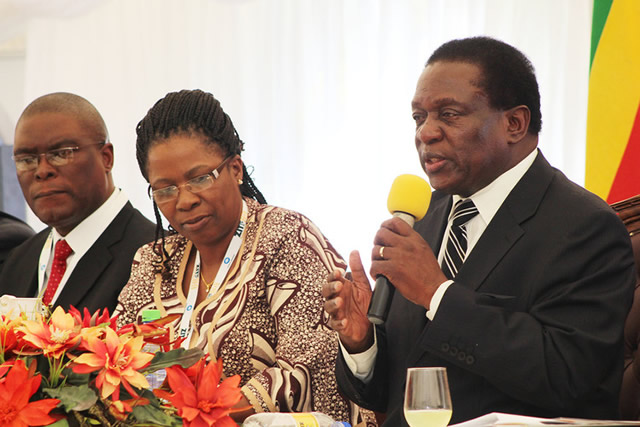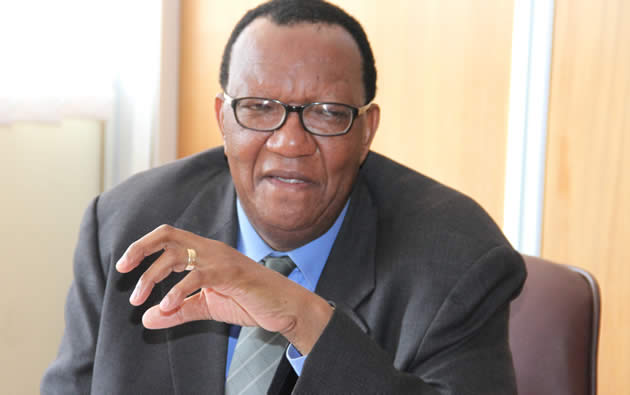Plans to capacitate Fidelity Printers


Vice President Emmerson Mnangagwa addresses delegates during a business conference at the ZITF in Bulawayo yesterday. Listening (from left), are ZITF Company board chairman Bekithemba Nkomo and Industry and Commerce Deputy Minister Chiratidzo Mabuwa
Nduduzo Tshuma
THE government is working on capacitating Fidelity Printers and Refinery to become a strategic national and regional gold processing centre, Vice President Emmerson Mnangagwa said yesterday.Addressing delegates during the International Business Conference at the Zimbabwe International Trade Fair (ZITF) in Bulawayo, VP Mnangagwa said export-led growth was one of the strategies adopted by the government through Zim-Asset’s value addition and beneficiation cluster.
He said the strategy was aimed at discouraging exports of raw materials and encouraging local processing of resources into higher value goods, which would create employment.
“A good example of value addition and beneficiation that I can think of is Fidelity Printers and Refinery,” said VP Mnangagwa.
He said in 1987, Fidelity Printers and Refinery commenced gold processing and refining with an installed capacity of producing 50 tonnes of gold per year at a purity of 99.9 percent resulting in it being awarded accreditation on the London Bullion Market Association in October 1989.
“At its peak, Fidelity was a player on the international market and would refine gold from other countries. In pursuit of Zim-Asset goals, it’s my conviction that we need to capacitate companies such as Fidelity Printers and Refinery to once again play a pivotal role in the gold industry in our region,” said VP Mnangagwa.
“I believe we’re strategically positioned in the region to be a significant player for gold refinery and the efforts of the Reserve Bank of Zimbabwe in this regard need to be applauded and fully supported.”
The Vice President also said the diamond industry had made significant progress towards value addition through the establishment of the diamond centre in Harare which is expected to cut and polish the precious mineral before export.
This, VP Mnangagwa said, is a sustainable way of creating decent employment as well as ensuring higher returns on precious minerals as they will fetch better prices on the international market.
He said there was a great potential for the platinum and chromium industries to do the same as the setting up of a platinum refinery would bring with it a lot of benefits to society while the establishment of smelters would also boost the metal and iron industry.
The VP said value addition and beneficiation was not only limited to the mining sector but cuts across all sectors of the economy including the services sector.
He said the country is an agro-based economy with more than 20 percent of its Gross Domestic Product (GDP) being derived from agricultural production hence agriculture presents vast opportunities for value addition and beneficiation through the strong linkages with the manufacturing sector.
“Imminently most of the manufacturing industries derive about 60 percent of their inputs from the agricultural sector, the most popular examples being the food processing industries which need to be supported,” said VP Mnangagwa.
He urged industries to take advantage of incentives put in place by the government to process locally and export finer goods, finished goods and semi processed goods.
VP Mnangagwa said as a national strategy, value addition and beneficiation was anchored on the private sector taking a key role in the funding and execution of the actual production activities as there is a great opportunity to satisfy the profit motive.
“Several initiatives have also been put in place to improve the business environment, one such initiative is the issue of doing a business study by the Ministry of Finance and Economic Development, which seeks to identify the impediments to doing business in Zimbabwe as well as come up with reforms to improve the situation,” said VP Mnangagwa.
“It’s important to hear that most of these reforms don’t require money but only a change in our approach to business. These are the reforms we should implement expeditiously as we demonstrate our renewed zeal to develop our economy.”
He stressed the need to complement local investment with foreign direct investment to provide capital and operational requirements of the manufacturing sector which is the main driver of value addition and beneficiation.
The VP said operationalising the Zimbabwe Investment Authority (ZIA)’s one stop shop investment centre was imperative as it would simplify and quicken the process of investing in the country.
He said the country was generally a high cost production centre compared to regional economies like South Africa.
“In order to understand this phenomenon and come up with ways of improving our competitiveness, the national economic consultative forum is coordinating the production of a national competitiveness assessment report which is expected to be completed in August this year,” he said.
“Competitiveness is underpinned by stable public finances properly regulated and working back in system and a broad vision for a prosperous economic future.”
VP Mnangagwa said a national competitiveness assessment report was expected to highlight priority competitiveness and competitiveness challenges.
He said the government, the private sector and other players should collectively deal with these challenges.
VP Mnangagwa said the government was prioritising infrastructure development projects such as the recently completed rehabilitation of the Plumtree-Bulawayo-Harare-Mutare highway among others.
He said the rehabilitation and expansion of the Beitbridge-Harare-Chirundu road — set to facilitate regional integration as it is the main link with Sadc — would also be commencing soon.
VP Mnangagwa also said infrastructure units at Hwange Power Station were undergoing routine maintenance to ensure consistent supply of electricity while new projects in power generation include Kariba South expansion, Hwange 7 and 8 projects.
The two projects set to be complete by 2018 are respectively expected to bring in an additional 300MW and 600MW to the national grid.
Other notable projects include the Gwanda and Insukamini solar power stations expected to contribute a total of 300MW.
VP Mnangagwa said the government was also seized with innovation in science and technology and information communication technology critical in ensuring a viable manufacturing sector anchored on low cost and efficient modern technologies.
He said one such project is the high performance super computer project that was commissioned by President Robert Mugabe this year.










Comments